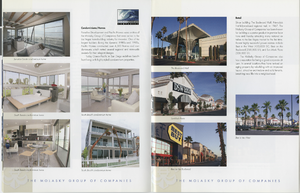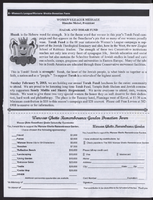Search the Special Collections and Archives Portal
Search Results
Elmer Curley oral history interview
Identifier
Abstract
Oral history interview with Elmer Curley conducted by Claytee D. White on November 1, 2011 for the Boyer Early Las Vegas Oral History Project. Elmer Curley discusses working in public services at the University of Nevada, Las Vegas (UNLV) Library for a number of years under a long list of library directors beginning in 1967.
Archival Collection
Donna Newsom oral history interview
Identifier
Abstract
Oral history interview with Donna Newsom conducted by Claytee D. White on June 11, 2009 for the Boyer Early Las Vegas Oral History Project. Donna Newsom discusses working as a nurse in the southern United States, at a Girl Scout camp in Colorado, and at Southern Nevada Memorial Hospital in Las Vegas, Nevada. She also discusses working in real estate in New Orleans, Louisiana.
Archival Collection
Alvin Einberger oral history interview
Identifier
Abstract
Oral history interview with Alvin Einberger conducted by David G. Schwartz on February 08, 2007 for the Remembering Jay Sarno Oral History Interviews. In this interview, Einberger discusses the life of Jay Sarno. He recalls his experiences with Sarno and tells stories about Sarnos’ career in the gaming industry. Lastly, Einberger discusses the opening of Caesars Palace Hotel and Casino in Las Vegas, Nevada in 1966.
Archival Collection
Willis Evans oral history interview
Identifier
Abstract
Oral history interview with Willis Evans conducted by Kathleen Morgan La Spina on December 02, 1986 for the Ralph Roske Oral History Project on Early Las Vegas. Evans discusses arriving and living in Las Vegas, Nevada. Evans also discusses being involved in the civic organization, District Attorney Youth Advisory Group. The interview concludes with a discussion of Boulder (Hoover) Dam, and changes in Las Vegas’ economy, politics, and environment.
Archival Collection
Edna Gray Fox oral history interview
Identifier
Abstract
Oral history interview with Edna Gray Fox conducted by an unidentified interviewer on February 03, 1972 for the Ralph Roske Oral History Project on Early Las Vegas. Fox discusses the Last Frontier Hotel, Thunderbird Motel, Warm Springs Ranch, and the Wallace Canyon Fire.
Archival Collection

Transcript of interview with Laura & Don Garvin by Michael Martocci, March 3, 1979
Date
Archival Collection
Description
On March 3, 1979, Michael Martocci interviewed Laura (born in California) and Don Garvin (born in Goldfield, Nevada) about their lives in Las Vegas, Nevada. The two provide details on their family background, the first sources of water in Las Vegas, and the early city limits. They also describe their early occupations, religion, gambling, the Mormon Fort, and the effects of the Great Depression. The interview concludes with a brief discussion on the development of the Las Vegas Strip and recreational activities.
Text

Meeting minutes for Consolidated Student Senate, University of Nevada, Las Vegas, February 28, 2000
Date
Archival Collection
Description
Text

Brochure from the Molasky Group of Companies, approximately 2010
Date
Archival Collection
Description
This brochure includes highlights of the Molasky Group of Companies, specializing in real estate development.
Text

Transcript of interview with Roger Thomas by Stefani Evans and Claytee D. White, August 31, 2016
Date
Archival Collection
Description
As he reveals in this oral history, Roger Thomas is, among many other things, a son, a father, a brother, a husband, a student, an artist, a visionary, and a philanthropist. As the second son of Peggy and E. Parry Thomas’s five children, Roger was raised a Mormon child of privilege and civic responsibility. The banking family summered in Newport Beach, wintered in Sun Valley, and taught their children by words and deeds that it is not up for debate if you will be involved in your community; the only question is how you will apply your talents and resources to benefit your community. Roger absorbed the lessons well. As a child who struggled in school but excelled in art, he attended his last two years of high school at Interlochen Arts Academy, graduating in 1969, finally finding himself “in an environment where what I did had currency.” From there he earned his BFA from the School of the Museum of Fine Arts Boston and Studio Degree from Tufts University before returning to Las Vegas and eventually joining Steve Wynn’s team in 1981. As Executive Vice President of Design for Wynn Design & Development, he is the man in whom Steve Wynn places his trust to make real at each Wynn property the Wynn design philosophy: aim for a constituency of highly sophisticated, well-traveled, very educated people and give them a reality, a now, that is so fetching, so alluring they wish to be no place else. As he was mentored by his father and Steve Wynn, he too is mentoring those who will follow him. At Wynn, the next generation will carry forward the Wynn idea of evoca-texture, of creating “moments of experiential emotion that result in a memory so captivating and so unique that if you want to repeat that you have to come back.” At home, he collaborates with his daughter on a children’s book that has the potential to become a series; she is the illustrator, while he provides the words. Roger Thomas sat for this interview five days after his father, E. Parry Thomas, passed away in Idaho. Instead of postponing the interview to a more convenient time, Roger kept the appointment and explained, “This is for UNLV. If I’d cancelled my father would have killed me.”
Text

